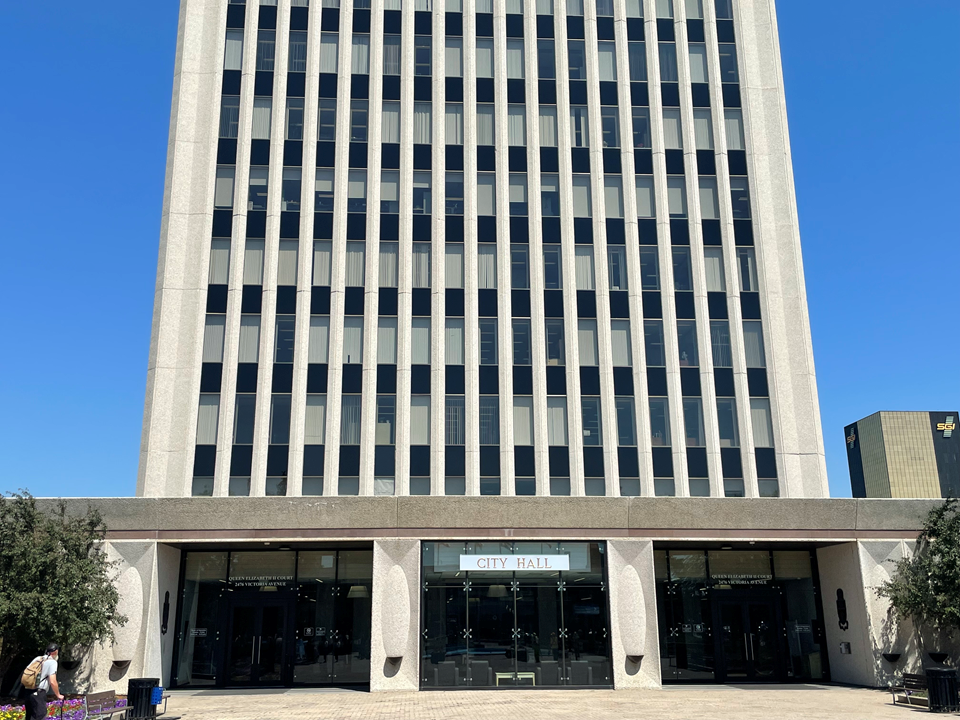REGINA — The first steps to approve a new cost of the Indoor Aquatics Facility (IAF) were passed during Wednesday’s executive committee meeting
A report presented in front of the committee showed a $40 million increase to construct the IAF from the original $245.1 million price tag when city council approved its construction last Oct.
“I think it was a shock for everybody,” said Mayor Chad Bachynski, referring to the cost escalation.
Several factors played a role in the increased cost, including labour market constraints. Helen Doka, project coordinator at Wright Construction, said the labour market is likely factoring into half of those cost increases.
The report mentions Saskatchewan continues to see a shortage of skilled workers, and a roughly 60 per cent retention rate for graduates in trades isn’t sufficient to offset retirement and overall attrition.
Other factors contributing to $40 million include escalating construction costs, capital investment and demand, transportation and fuel cost increases, and global supply chain disruptions.
To offset an additional $40 million, city administration recommended relocating $30 million in funding currently earmarked for other recreation capital projects.
These projects include
- Outdoor Pools $21.704 million
- Artificial Turf Field $5.610 million
- Pickleball Spaces $1.4 million
- Dog Parks $1.286 million
Jessie Morris of Off Leash Dog Park Use Group argued there are few dog-friendly spaces in the city for an estimated 30,000 canines in Regina and reducing funding could cause tension for dog owners and non-dog owners.
“We will see leakage into public spaces not intended to be dog-friendly.”
Coun. Sarah Turnbull (Ward 5) made an amendment to direct the $1.286 million in funding from the outdoor pools.
Administration said deferring money from the outdoor pools capital projects could delay the reconstruction of the Buffalo Meadows Pool to 2031.
“I can’t support an amendment that might defer reconstruction on that pool, which puts it at risk of failure,” said Coun. Shanon Zachidniak (Ward 8).
Turnbull’s amendment was defeated 9-1, with Bachynski being away from the meeting.
As for paying the other $10 million, administration recommended allocating $10 million of debt towards the IAF.
By taking on more debt, City of Regina chief financial officer Daren Anderson said this would cost the median household an additional approximate 57 cents per month to help the city pay it off.
Coun. Clark Bezo (Ward 10) was concerned with more debt being added, saying his constituents saw a 23 per cent tax increase this year alone.
“We really have to be cautious with how we balance the pool, and the scope that it stands in, to what we have with the infrastructure deficit.”
Bezo put forward a motion to delay approving the additional funding until city council started overseeing their 2026-2027 budget in Sept.
His motion was defeated 8-3, with Councillors David Froh (Ward 3), Mark Burton (Ward 4), Turnbull, Victoria Flores (Ward 6), Shobna Radons (Ward 7), Zachidniak, Jason Mancinelli (Ward 9), and Mayor Bachynski voting against.
Geothermal energy
To heat the new IAF, city council approved back in 2023 the creation of a $28.5 million geothermal facility.
Of the 28.5 million, “$13.8 million is funded by City debt, with the remaining $14.7 million funded by the federal and provincial ICIP grant,” per the report.
The city sees the facility as a benefit for renewable energy, aligning with its Energy & Sustainability Framework for a net-zero community by 2050.
However, Coun. Dan Rashovich (Ward 1) mentioned that while being energy efficient is important, it’s not always economically sustainable.
Rashovich also felt relying on a power source not utilized by other bigger cities in Canada would be risky. He tabled an amendment to make natural gas the primary heating source for the IAF.
This was meet with opposition, including from Mancinelli.
“We got experts from all around the world doing these things, so I don’t take the risk position being made of this.”
Zachidniak also said it would be “short-sighted” to walk away from this.
“If we walked away from this, I would find it appealing. We received federal funding to proceed with this important opportunity to explore it further.”
Rashovich’s amendment was shot down 2-9.
Executive committee also directed administration to collect data on how geothermal energy can help develop communities at large, including the former Taylor Field site, while also seeing any potential revenue which could be gained from selling thermal energy.
City council will finalize approval of the $285.1 million for the IAF next week.
If approved, $156 million will be paid off by debt, $49.9 million paid via annual capital funding, $43.2 million from federal funding, and $36 million in provincial funding.
Regina will also look into seeing if the province would exempt the PST from this project, as Bachynski will meet with Saskatchewan in the coming days.
If everything is finalized, the city expects the IAF to start undergoing construction in Q3 of 2025.




